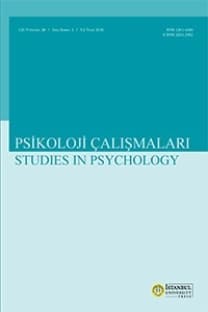Sosyal Bilimcilerin Sosyal Bilim ve Üniversite Temsilleri
Sosyal temsiller, üniversite, sosyal bilim, akademisyen
Representations of Social Science and University among Social Scientists
Social representations, university, social science, academician,
___
- Arkonaç, S. A. (2004). Gerçekliğin yerel inşasında Kartezyen olmayan özne, öteki ve fail. S. Arkonaç (ed.), Doğunun ve Batının Yerelliği: Bireylik Bilgisine Dair, 249-273, İstanbul: Alfa.
- Arslan, H. (1992). Epistemik Cemaat, Bir Bilim Sosyolojisi Denemesi. İstanbul: Paradigma.
- Barnett, R. (2008). Her Türlü Aklın Ötesin- de Üniversitede İdeoloji ile Yaşamak, çev. S. Eren. İstanbul: Bilgi Üniversitesi Yayınları.
- Baysal, B. (1999). Cumhuriyet Dönemi’nde Türkiye’de Bilim. Tüba Türkiye Bilim- ler Akademisi: Türkiye Cumhuriyeti’nin 75. Yılında Tüba Konferansları, Ankara: Tübitak Matbaası.
- Bok, D. (2007). Piyasa Ortamında Üniver- siteler, çev. B. Yıldırım. İstanbul: Bilgi Üniversitesi Yayınları.
- Burns, R & Burns, R. (2008). Business Rese- arch Methods and Statistics using SPSS, Extension Chapters on Advanced Techni- ques, Chapter 23 - Cluster Analysis,pp. 552-567, published in http://www. uk.sagepub.com/burns/chapters.htm. London: Sage.
- Charle, C. & Verger, J. (2005). Üniversitelerin Tarihi. Ankara: Dost Kitabevi.
- Erdoğan, N. (2003). Kültürel Çalışmalar, (Kendiliğinden) İdeoloji(si) ve Akade- mya. Toplum ve Bilim 97, Yaz, 43-64.
- Evans, G. R. (2007). Akademisyenler ve Gerçek Dünya, çev. E. Kılıç. İstanbul: Bilgi Üniversitesi Yayınları.
- Fiske, S. T. & Taylor, S. E. (1984): Social Cognition. New York: Random House.
- Fiske, S. T. & Leyens J.-P. (1997). Let so- cial psychology be faddish or, at least, heterogeneous. In C. McGarty and S. A: Haslam (eds), The Message of Social Psychology, p. 92-113. Oxford: Basil Blackwell.
- Kerr, C. (1963). The Uses of The University. New York: Harper & Row.
- Hira, İ. (2000). Sosyal Bilimler: Yasa Koyu- cu Tasarımdan Yorumcu Tasarıma. Bilgi Sosyal Bilimler Dergisi, 81-96.
- Hira, İ. (2000a). Max Weber’in Yöntem Anlayışı. Bilgi Sosyal Bilimler Dergisi, 45-58.
- İnönü, E. (1999). Cumhuriyet Döneminde Türkiye’de Bilime Toplu bir Bakış ve Gelecek Hakkında Beklentiler. Tüba Türkiye Bilimler Akademisi: Türkiye Cumhuriyeti’nin 75. Yılında Tüba Kon- feransları. Ankara: Tübitak Matbaası.
- Keskin, F. (1998). İnsan Bilimlerinin Bir Telosu Var mı? Sosyal Bilimleri Yeniden Düşünmek. İstanbul: Metis.
- Lubek, I. (1997). Reflexively recycling so- cial psychology: a critical autobiogra- phical account of an evolving critical social psychological analysis of social psychology. In T. Ibànez and L. İniguez (eds), Critical Social Psychology, 195- 229. London: Sage.
- Moscovici, S. (1984). The phenomenon of social representations. In R. Farr and S. Moscovici (eds.), Social Representa- tions, p. 3-69. Cambridge/Paris: Cam- bridge University Press, Maison des Sciences de l’Homme.
- Moscovici, S. (1988). Notes towards a de- scription of social representations. Eu- ropean Journal of Social Psychology, Vol 18, 211-250.
- Moscovici, S. and Vignaux, G. (2001). The concept of themata (translated by G. Duveen). In. G. Duveen (ed.), Social Representations: Explorations in Social Psychology, p. 156-183. New York: New York. Un. Press.
- Norusis, M. (2011). IBM SPSS Statistics 19 Statistical Procedures Companion. Upper Saddle River, NJ: Prentice Hall.
- Oktik, N. (2001). Globalleşme ve Yüksek Öğrenim. Doğu Batı: Dünya Neyi Tartı- şıyor? -1 Küreselleşme, sayı 18, 193-204.
- Öncü, A. (1998). Sosyal Bilimlerde Yeni Meşruiyet Zemini Arayışları. Sosyal Bilimleri Yeniden Düşünmek, İstanbul: Metis.
- Özlem, D. (1998). Evrenselcilik Mitosu ve Sosyal Bilimler. Sosyal Bilimleri Yeniden Düşünmek, İstanbul: Metis.
- Paker, K. O. (2004). Batı dışı toplumlarda sosyal psikolojiyi yeniden düşünmek: İnşacı yaklaşımın imkanları üzerine bir deneme. S. A. Arkonaç (ed), Doğunun ve Batının Yerelliği: Bireylik Bilgisine Dair, s. 203-248. İstanbul: Alfa.
- Paker, K. O. (2005) Günlük Düşüncede Mo- dernlik, Din ve Laiklik. Ankara: Vadi.
- Pepitone, (1997). Nonmaterial beliefs: Theo- ry and research in cultural social psycho- logy. In C. McGarty and S. A: Haslam (eds), The Message of Social Psychology, p. 252-267. Basil Blackwell: Oxford.
- Shotter, J. (2004). Sosyal inşacılığın öte- sinde: Kartezyen özne ve faili yeniden düşünmek ve yeniden cisimleştirmek. S. Arkonaç (ed.), Doğunun ve Batının Yerelliği: Bireylik Bilgisine Dair, 161- 199. İstanbul: Alfa.
- Tekeli, İ. (2004). Eğitim Üzerine Düşünmek. 2. Baskı. Ankara: Türkiye Bilimler Aka- demisi Yayınları.
- Türkiye’nin Yükseköğretim Stratejisi (2007). http://www.yok.gov.tr/duyuru/ yok_strateji_kitabi.pdf
- Wallerstein, I. (1990). Culture as the Ideolo- gical Battleground of the Modern World- System. In (ed) M. Featherstone, Global Culture, p. 31-55. London: Sage.
- Wallerstein, I. (2000). Bildiğimiz Dünyanın Sonu, Yirmi Birinci Yüzyıl İçin Sosyal Bi- lim. Çev. Tuncay Birkan. İstanbul: Metis.
- van Dijk, T. A. (1997). Discourse as inter- action in society. In (ed.) T. A. van Dijk, Discourse as Social Interaction, p. 1-37. London: Sage.
- van Dijk, T. A. (1998). Ideology. A Multi- disciplinary Approach. London: Sage.
- ISSN: 1304-4680
- Başlangıç: 1956
- Yayıncı: İstanbul Üniversitesi
Üstün-Zekalı ve Normal-Zekalı Çocuklarda Yönetsel İşlevler: Londra Kulesi Testi
Marilena LEANA TAŞCILAR, Sevtap CİNAN
Sosyal Bilimcilerin Sosyal Bilim ve Üniversite Temsilleri
Deniz ATALAY-ATA, Sevtap Cinan, Reyhan SAYDAM, Behiye ALYANAK
Alkol Bağımlılığında İçselleştirilmiş Damgalanma: Depresif Belirtilerle İlişki
